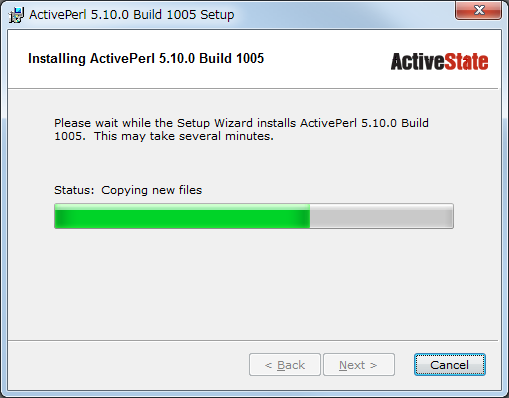
- #ACTIVEPERL 5.8 7 DOWNLOAD INSTALL#
- #ACTIVEPERL 5.8 7 DOWNLOAD SERIAL#
- #ACTIVEPERL 5.8 7 DOWNLOAD CODE#
#ACTIVEPERL 5.8 7 DOWNLOAD SERIAL#
I'm guessing that at least someone here has tried to use the serial port with Perl under Windows- how do you get Perl to access the serial port? If I'm fighting a losing battle even trying to use Perl then I'll cut my losses and switch to Java or something, but I want to make sure Perl isn't going to work first. PPM denies all knowledge of it, and the most credible looking installer (that is ten years old) claims to be a windows port, but has a Makefile that looks for /dev/tty and tries to run "./configure"- understandably my XP box doesn't quite know what to make of that. However, try as I might I can't get the Win32::SerialPort module to work.
#ACTIVEPERL 5.8 7 DOWNLOAD CODE#
add-pod-file Utility to add new pod/.pod file to core distribution Compare the performance of perl code snippets across multiple perls.
#ACTIVEPERL 5.8 7 DOWNLOAD INSTALL#
I chose Perl because I'm familiar with it, it's easy and my host script is using SendKeys. perl-5.36.0 404 ++ Documentation INSTALL PACKAGING notes and best practice for packaging perl 5 README.pod README for the Porting/ directory in the Perl 5 core distribution. I'm trying to get my Arduino to push data to my computer (running a fairly standard Windows XP Pro) which will be interpreted by a Perl script. I suggest using ActivePerl 5.6.1 until this bug is resolved.Firstly, apologies if this question has been answered anywhere else already- I searched for all the keywords I could think of and haven't found anything. It looks like there is a memory handling problem specific to this version of ActivePerl that is causing the poor performance. There are a number of bug reports involving similar slow performance with 5.8.7. With ActivePerl 5.6.1 (build 638), it takes 0.150 seconds on the same system. With ActivePerl 5.8.7 (build 815), it takes 82.709 seconds to read and join these 2308 strips. I have run tests with different versions of ActivePerl to measure exactly how long it takes to read these strips from file and concatenate them into a single data buffer in memory: It turns out that the problem isn't with ExifTool. In your sample file, the image is split into 2308 strips which are read individually from the file. PPM 4.0: Fetch and install Infoblox packages.) 2.1 Add a PPM repository to the. The slow-down occurs when reading a large number of big blocks from file. (For PPM 4.0, included with ActivePerl 5.8.8.818 and later, see 5. I have downloaded ActivePerl 5.8.7 (the version you are using) and have reproduced your problem. So please, if you're still reading this, it would be very useful if I could have a copy of the file you were having problems with. But I'm more convinced now than ever that it is something I could probably fix if I could reproduce it. Now I'm stuck because I can't reproduce your problem. The test was run on a 2.4GHz laptop.but I digress. Pretty amazing I think, considering this is only 25% of the total time. So exiftool somehow manages to extract all that information from the ORF image and re-structure the TIFF in 1 second.

What is amazing to me is that it takes 3 seconds just to copy the file using "copy" in the command shell. Then I ran exiftool to copy all tags from the ORF to the TIFF.įrankly, I'm amazed by the result. The ORF was 14MB and the converted TIFF was 25MB. I found a PC to test this out, downloaded IrfanView and the formats plugins, and installed ActivePerl 5.6.1 (I know you're probably running 5.8, but I don't think this should make a difference and I wanted to run some tests with an older version of Perl at the same time), and I used IrfanView to convert a E-300 ORF file to TIFF.


 0 kommentar(er)
0 kommentar(er)
